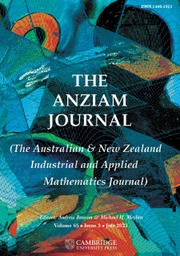No CrossRef data available.
Article contents
RARE EVENTS IN THE STOCHASTIC CAMASSA–HOLM EQUATION
Part of:
Stochastic analysis
Published online by Cambridge University Press: 06 March 2017
Abstract
Core share and HTML view are not available for this content. However, as you have access to this content, a full PDF is available via the ‘Save PDF’ action button.
We investigate rare or small probability events in the context of large deviations of the stochastic Camassa–Holm equation. By the weak convergence approach and regularization, we get large deviations of the regularized equation. Then, by stochastic equations exponentially equivalent to the corresponding laws, we get large deviations of the stochastic Camassa–Holm equation.
MSC classification
Information
- Type
- Research Article
- Information
- Copyright
- © 2017 Australian Mathematical Society
References
Barlow, M. T. and Yor, M., “Semi-martingale inequalities via the Garsia–Rudemich–Rumsey lemma, and applications to local time”, J. Funct. Anal.
49 (1982) 198–229; doi:10.1016/0022-1236(82)90080-5.CrossRefGoogle Scholar
Bona, J. L. and Smith, R., “The initial value problem for the Korteweg–de Vries equation”, Philos. Trans. R. Soc. Lond. A
278 (1975) 555–601; doi:10.1098/rsta.1975.0035.Google Scholar
Budhiraja, A. and Dupuis, P., “A variation”, Probab. Math. Statist.
20 (2000) 39–61; http://www.math.uni.wroc.pl/∼pms/files/20.1/Article/20.1.3.pdf.Google Scholar
Camassa, R. and Holm, D., “An integrable shallow water equation with peaked solitons”, Phys. Rev. Lett.
71 (1993) 1661–1664; doi:0031-9007/93/71(11)/1661(4)06.00.CrossRefGoogle ScholarPubMed
Chen, Y., Gao, H. J. and Guo, B. L., “Well posedness for stochastic Camassa–Holm equation”, J. Differential Equations
253 (2012) 2353–2379; doi:10.1016/j.jde.2012.06.023.CrossRefGoogle Scholar
Da Prato, G. and Zabczyk, J., Stochastic equations in infinite dimensions (Cambridge University Press, Cambridge, 1992).CrossRefGoogle Scholar
Davis, B., “On the
 $L^{p}$
-norm of stochastic integrals and other martingales”, Duke Math. J.
43 (1976) 696–704; doi:10.1215/S0012-7094-76-04354-4.CrossRefGoogle Scholar
$L^{p}$
-norm of stochastic integrals and other martingales”, Duke Math. J.
43 (1976) 696–704; doi:10.1215/S0012-7094-76-04354-4.CrossRefGoogle Scholar
Dembo, A. and Zeitouni, O., Large deviations techniques and applications (Jones and Bartlett, Boston, 1993).Google Scholar
Dunford, N. and Schwartz, J., Linear operators (Interscience Publishers, John Wiley and Sons, New York, 1958).Google Scholar
Dupuis, P. and Ellis, R. S., A weak convergence approach to the theory of large deviations (Wiley, New York, 1997).CrossRefGoogle Scholar
Friedrichs, K. O., “On the differentiability of the solutions of linear elliptic differential equations”, Commun. Pure Appl. Math.
3 (1953) 299–326; doi:10.1002/cpa.3160060301.CrossRefGoogle Scholar
Fuchssteiner, B. and Fokas, A., “Symplectic structures, their Bäcklund transformations and hereditary symmetries”, Phys. D
4 (1981) 47–66; doi:10.1016/0167-2789(81)90004-X.Google Scholar
Girsanov, I. V., “On transforming a certain class of stochastic processes by absolutely continuous substitution of measures”, Theory Probab. Appl.
5 (1960) 285–301; doi:10.1137/1105027.CrossRefGoogle Scholar
Gronwall, T. H., “Note on the derivatives with respect to a parameter of the solutions of a system of differential equations”, Ann. of Math.
20 (1919) 292–296; doi:10.2307/1967124.CrossRefGoogle Scholar
Young, W. H., “On the multiplication of successions of Fourier constants”, Proc. R. Soc. Lond. A
87 (1912) 331–339; doi:10.1098/rspa.1912.0086.Google Scholar

